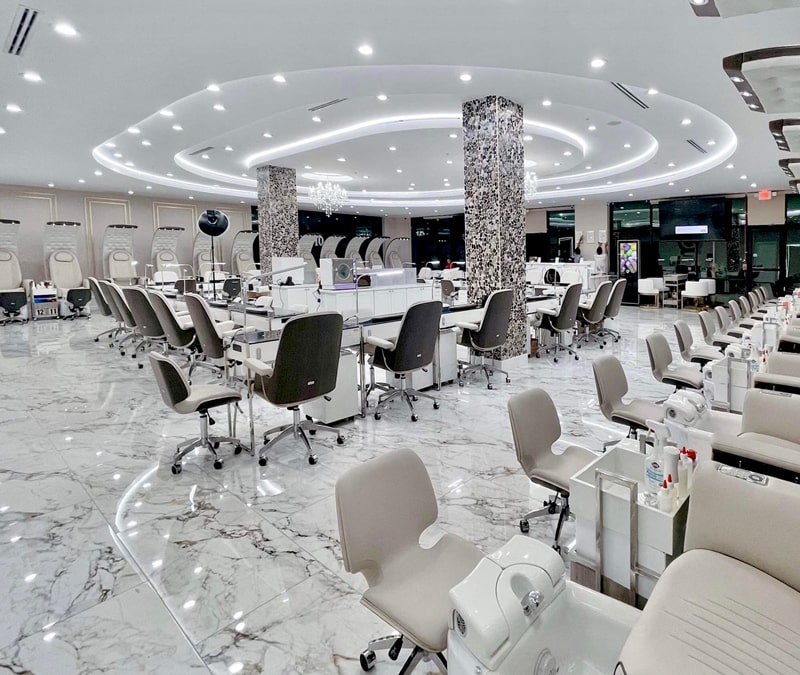
Heath, Safety & Violence Policy
Safety & Health Considerations
A cosmetologist, barber, or esthetician must possess hand-to-eye coordination and leg mobility in order to move about while performing services. Clients are shampooed by their stylist at the shampoo bowl, then moved and seated in an adjustable hydraulic styling chair. The stylist moves around the client as the service is performed.
Persons unable to stand for long periods of time or having limited mobility would have difficulty using regular shampoo bowls and hydraulic chairs. Manicuring and the application of artificial nails do not require standing or mobility. Clients are seated for the entire manicure or artificial nail application.
The Esthetician program does not require a great deal of physical mobility; however, hand and finger strength is required for the massage portion of a facial skin service. Facial clients generally recline on an adjustable facial chair with the skin technologist seated at the client’s head. Make-up, cosmetic applications, and brow shaping are performed while the client is seated and the cosmetology professional is in a standing position.
Instructors in this profession work a lot on their feet, and long hours are required.
Hazardous Chemicals
On a daily basis, students and cosmetology professionals handle and store hazardous chemical solutions and products, which could burn the skin and scalp, damage hair, or produce dangerous fumes if not properly used, mixed, and stored. If a student is, or becomes pregnant at the time of enrollment or while attending training, the school will require a written release from the student’s physician before the student is allowed to begin or continue their cosmetology training. (This policy is intended to protect both the student and the student’s unborn child.)
Allergic Reactions
The products, chemicals, and solutions routinely used by students and cosmetology professionals may cause allergic reactions. Students are instructed to follow all manufacturers’ instructions, to wear disposable gloves, and to protect their clothing by wearing their lab coats during all chemical operations. Should any type of allergic reaction occur, a student is required to immediately notify a staff member.
Your Feet and Legs
In order to work in the cosmetology profession, all students and cosmetology professionals must have the use of their feet and legs. In the future work environment, a cosmetology professional is expected to stand for long hours while performing services. To protect from any type of “career-ending” injury or permanent damage to feet and legs, students are advised to wear closed-toed shoes with socks, with non-skid soles, that have a reasonable heel height.
Students and cosmetology professionals work on concrete or linoleum floors, and on a daily basis, they lift volume containers of shampoos and other products off shelves. To support the feet and legs and protect them from falls, slipping, or other injuries, students must wear appropriate footwear.
Skin and Clothing
Students and cosmetology professionals handle products and chemical disinfectants that can burn skin, enter the body, and damage clothing. To protect, prevent, and minimize the damage that can be caused by chemical spills and splashes, and to promote general cleanliness, students are required to wear protective smocks and to protect clients with protective aprons.
Physical Contact
Students and cosmetology professionals maintain close body contact with clients. During the performance of a service, skin and hair cells pass from the client to the student. A student may encounter a parasite or a contagious disease and may be exposed to human blood or other bodily fluids. Students are instructed to wear disposable gloves and their lab coats when working with the public, and to follow all safety procedures to ensure that a disease or parasite cannot infect the student or additional persons.
Electrical Appliances
Electrical appliances such as blow dryers and curling irons are used near sink and water areas. These appliances must be properly cared for and maintained to prevent electrical shock. Students are not allowed to use any appliance with a frayed or “taped” cord. All electrical appliances must be plugged into grounded outlets. Electrical cords cannot be stretched across aisles.
Solicitation
No solicitors are allowed on Atlanta Beauty & Barber Academy premises at any time or day. Violators will be reported to local authorities if necessary.
Weapons Policy
Weapons are not allowed on the premises, including the school building and cars parked on the premises. Anyone found to be in possession of any weapon, including but not limited to guns, knives, and stun guns, will be terminated from the program with no eligibility to be reinstated.
Accidents/Emergency Medical Care
If and when an accident occurs at Atlanta Beauty & Barber Academy, medical assistance will be obtained if necessary. If an emergency medical situation arises, a plan of action will be taken up with the instructor, and proper authorities will be notified. Emergency phone numbers are kept in the instructor’s office and at the front reception area for easy access. When an accident has occurred, a follow-up Accident Report form must be completed after all actions taken are complete. These forms are to be completed by an instructor and filed in the student or employee files located in the Administration office.
Emergency Procedures & Evacuation
Atlanta Beauty & Barber Academy has emergency evacuation plans posted throughout the school building. Each student will be made familiar with his/her evacuation route, depending on the student’s work area.
Bomb Threat: In case of a bomb threat, the school building will be evacuated immediately. Instructors are responsible for making sure all students and clients are accounted for. The lead instructor is in charge of calling proper authorities.
Fire: Fire drills are held on a regular basis. In case of a fire on the premises or in the school building, staff will make sure all students and clients are out and away from the building and will proceed to the nearest exit. The lead instructor is in charge of calling 911.
Tornado: In case of a tornado, students and clients will be alerted. Building occupants will proceed away from windows, doors, and glass. Individuals are to gather in the classroom, hallway, or bathrooms. Staff will canvas the school area to make sure all students and clients are in the proper area.
Hostage Situation: Remain calm and cooperate with offenders.
Robbery: Safety comes first. In case of a robbery, staff and students will cooperate with the offenders. When an opportunity arises, proper authorities will be called.
Rape: If a rape situation should occur, the proper authorities will be called immediately. Any needed medical assistance will be obtained. The victim will be encouraged to seek proper counseling concerning the incident.
Problem Student or Client: If a problem situation arises with a student or a client, the instructor would first be called to resolve the problem. If the problem cannot be resolved at that point, the lead instructor will be consulted. If the problem is still unresolved, the school director will be consulted. If a person is out of control, the school director has the option of calling local law enforcement to have the person removed from the school premises.
Other Blog
-
 Cần bao lâu để nhận tax return?
Cần bao lâu để nhận tax return?
Một câu hỏi phổ biến trong mùa thuế, hãy cùng VNailTax làm s...
-
 Form 7004: form gia hạn thuế dành cho business
Form 7004: form gia hạn thuế dành cho business
Form 7004: form gia hạn thuế dành cho business Nếu bạn cần ...
-
 Các doanh nghiệp nhỏ phải trả mức thuế bao nhiêu tại Hoa Kỳ?
Các doanh nghiệp nhỏ phải trả mức thuế bao nhiêu tại Hoa Kỳ?
Khai thuế và đóng thuế ở Hoa Kỳ nổi tiếng là một công việc k...
